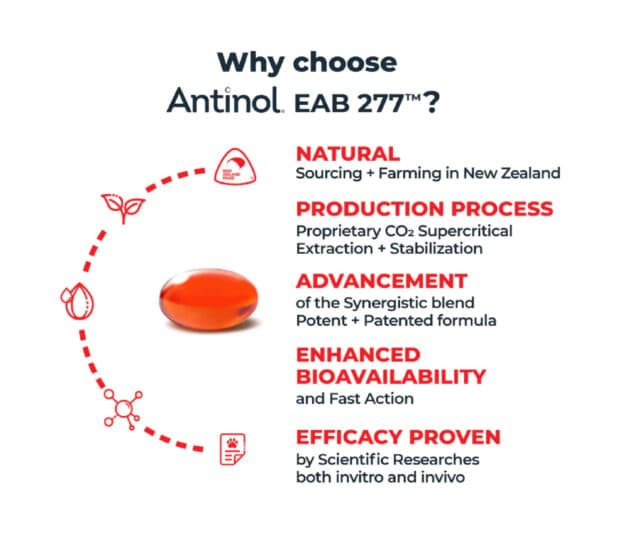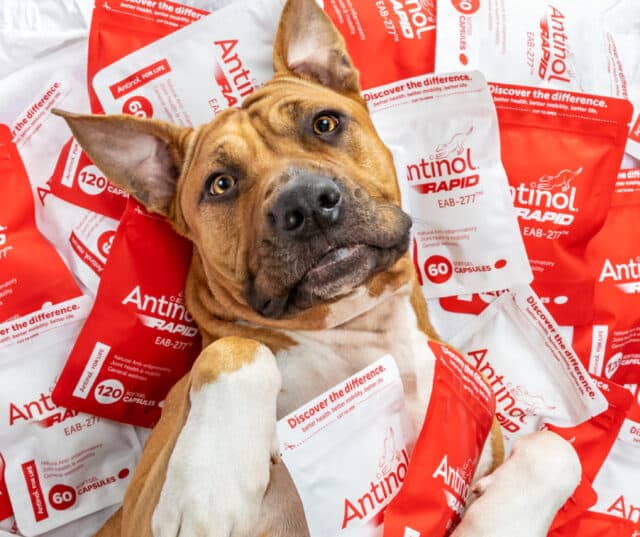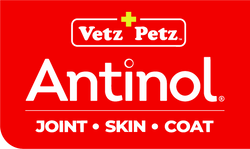When it comes to canine nutrition, understanding what is essential in the way of supplementation can be a confusing topic for pet parents. The questions we often see are:
- What are essential dog health supplements?
- What is the difference between a vitamin and a supplement?
- What are the best supplements for canine longevity?
Our goal is to take the guesswork out of dog supplementation and help you make an informed decision about your dog’s health and wellness.

DOES MY DOG REALLY NEED A SUPPLEMENT?
The very first question you should ask yourself when looking at canine supplementation, is what are your health goals for your dog? This will help you decide whether your dog requires a supplement or not.
Not all supplements are made equal and so it is important to then understand what the goals of that particular supplement are, and how effective they are doing that? For example, you wouldn’t purchase a product that claims to improve skin and coat health, if it didn’t have the ingredients to physically make that happen.
The most common forms of supplementation are focused around:
- Joint health
- Improving mobility
- Gut health
- Reducing anxiety
- Enhancing cognitive health
- Boosting immune strength
- Improving skin and coat
Some may target multiple areas within that list.
ARE DOG VITAMINS THE SAME AS DOG SUPPLEMENTS?
 Whilst there are some crossovers between supplements and vitamins, they are largely different.
Whilst there are some crossovers between supplements and vitamins, they are largely different.
Vitamins are organic compounds that are necessary to sustain life. Whilst vitamins have purposes to improve specific areas of health (eg. Vitamin A acts to improve retinal health), they are essential.
Canines have specific nutrient requirements and in most processed foods, the manufacturer will utilise a synthetic vitamin and mineral mix to ensure those minimal requirements are met. There are also wholefood vitamin and mineral base mixes to fill nutritional gaps in home-made and fresh food diets. These aim to achieve the same as the synthetic mixes, except are made utilising real, whole foods.
Supplements are designed to be supplemented on top of a dog’s diet and enhance it and should not be confused with essential vitamins and minerals.
PROACTIVE VS REACTIVE DOG SUPPLEMENTATION
Not all supplementation is designed to act in the same way. A lot of supplements aim to work in a proactive way instead of being reactive.
Proactive supplementation is designed to anticipate needs and challenges before they occur and provide ways to avoid or overcome said challenges in advance. Think of it like taking proactive action to ensure better health and wellbeing.
Reactive supplementation is typically utilised once a problem or health challenge has already occurred and is given to reduce symptoms.
#NOBEFORES #HAPPILYBETTERAFTER
Antinol is designed to do both. We aspire to Be Better and as a result our goal is to always be as proactive with health and wellness as we physically can. In an ideal world we would have generations of dogs that have no ‘before’s’.
Why treat chronic skin conditions as they occur? Why not provide the body with what it needs to absolutely thrive, so skin conditions aren’t even a thing?
WHAT SUPPLEMENTS DO WE RECOMMEND?
 This is largely an individual question as all dogs are unique and may have different health requirements and goals. However, something we are passionate about is improving longevity of both body and mind. In our opinion, we recommend that all dogs have an opportunity to experience great health at a cellular level, and that starts with Antinol Rapid.
This is largely an individual question as all dogs are unique and may have different health requirements and goals. However, something we are passionate about is improving longevity of both body and mind. In our opinion, we recommend that all dogs have an opportunity to experience great health at a cellular level, and that starts with Antinol Rapid.
There are other staple supplements that are on the top of our list for increasing longevity and providing better health and wellness.
Probiotics
Having good gut health is a known indicator of good general health. The balance of good bacteria in the gut flora can lead to many health benefits. Probiotic supplements offer specific strains that can target various functions of our dog’s body. One of the main reasons probiotics are so good for your health is that they have a positive effect on the gut lining.
A daily probiotic may also have other health benefits, such as making the skin and coat look and feel better, reducing intestinal gas, allergies, and yeast-related disorders, improving breath, and making bowel movements more regular and consistent.
Probiotics are generally considered safe for dogs and usually don’t cause any side-effects. But as every dog is created differently, always monitor your dog when starting them on anything new.
Magnesium
Magnesium helps promote the absorption and metabolism of other minerals such as calcium, phosphorus, sodium, and potassium. Not only that, but it also plays a role in the utilisation of B-complex vitamins and vitamins C and E. Magnesium is the second most abundant mineral in your dog’s body, after potassium.
In dogs, additional magnesium supplementation is often recommended for those with heart disease, diabetes, and epilepsy.
Magnesium is a crucial mineral for maintaining the overall health and well-being of dogs. It’s essential for many of the body’s functions and can help prevent and manage a variety of health conditions. However, as with any supplement, it’s essential to consult with a veterinarian to determine the appropriate dosage and administration for your pet.
CBD Oil
In recent years, we’ve seen a surge in the interest around the use of CBD – not only in human medicine, but in veterinary care too. Research suggests that medicinal cannabis may have similar therapeutic actions for animals where it has historically been used to treat the symptoms of medical conditions in humans.
CBD oil can be helpful for pets with epilepsy, arthritis, chronic pain and depressive or anxious behaviours. Some pet owners have also shared positive outcomes when treating their pets with CBD for the symptoms of cancer, diabetes and gastrointestinal concerns.
THE FINAL THOUGHT
When it comes to selecting a dog supplement, ask yourself what kind of approach you are taking to your dog’s longevity; reactive or proactive? It is always best to do your research, work with your veterinarian and ensure you are choosing quality over quantity.











